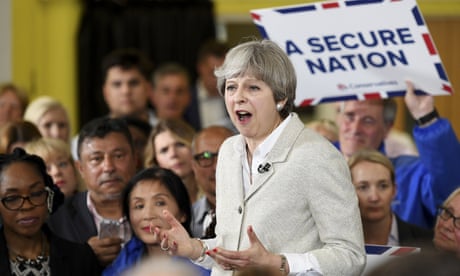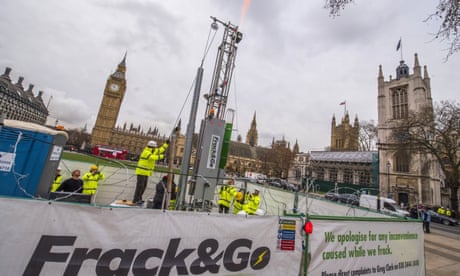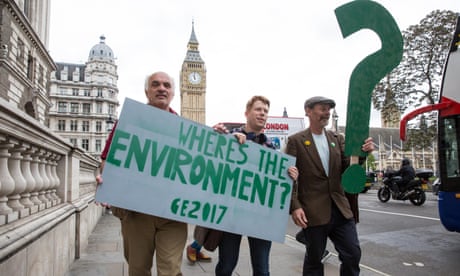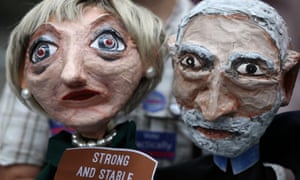Futures Forum: Concerns for campaigning: Lobbying Bill rejected by Lords
By the time it was passed, the Act was indeed making life difficult for civil society:
Futures Forum: Civil society under attack?
A year later, in September last year and following the Brexit vote, there were calls for the new Prime Minister to make amends:
Unlock Democracy has been working with Lord Brooke to table a Private Member's Bill - to be debated on 9 September - which aims to scrap the current bogus lobbying register and replace it with a genuine register.
The Bill would bring the UK into line with other institutions such as the US, EU and Scotland. It’s time for Theresa May to put clear blue water between her and Cameron. She can set the tone for her Premiership by backing real lobbying transparency.
Theresa May’s chance to shine a light on lobbying — Unlock Democracy
Futures Forum: Brexit: and lobbying
However, things are not looking good in the run-up to tomorrow's general election:
UK charities break silence on damage caused by Lobbying Act | Devex
As reported yesterday:
'Chilling' Lobbying Act stifles democracy, charities tell party chiefs
More than 50 charities say they have changed key messages during election campaign due to ‘unreasonable and unfair’ restrictions
 Labour and the Green party have called for the legislation to be repealed, while the Lib Dems and the SNP have urged reform. Photograph: Christopher Thomond for the Guardian
Labour and the Green party have called for the legislation to be repealed, while the Lib Dems and the SNP have urged reform. Photograph: Christopher Thomond for the GuardianFiona Harvey and Anushka Asthana
Tuesday 6 June 2017
Charities have been forced to change their key messages to the public during the general election because of the “chilling” effect of the controversial Lobbying Act, a group of leading UK organisations has warned.
Democratic debate on some of the biggest issues in the election campaign has been stifled by the law, a group of more than 50 charities writes in a letter sent to the main party leaders.
“Voices are being lost at this crucial time, and our democracy is poorer for it,” they said. Their concerns echo those of many charities, particularly in the field of social care, which told the Guardian they were unable to raise vital concerns over, and experiences of, the impacts of current and future policies.
 Charities say 'gag law' stops them speaking out on Tory social care plans
Charities say 'gag law' stops them speaking out on Tory social care plansThe Lobbying Act restricts what non-governmental organisations can say in the year before a general election. Billed as a brake on corporate lobbying as well as NGOs when it was brought in, its provisions have fallen harder on the non-profit sector, leading to an independent commission and the House of Lords recommending amendments.
Advertisement
In their letter sent on Monday, more than 50 UK charities called for the urgent reform of the controversial legislation, which they said was having a “chilling effect” on debates over policy ahead of Thursday’s snap election. They warned that charities were “weighed down by an unreasonable and unfair law which restricts our ability to contribute fully to a democratic society”.
The charities come from across the spectrum, representing social care, health, poverty, environment, and vulnerable groups. They include household names such as the hospice and neurological care charity Sue Ryder, AgeUK, Amnesty, the development charity Care, and Christian Aid.
Craig Bennett, chief executive of the Friends of the Earth charity network, which coordinated the letter along with the Bond group of more than 450 development charities, said: “The problem with the Lobbying Act is that it seriously damages charities’ ability to do their job to work for the greater public good. Important civic voices that speak for the most marginalised are being lost. If the act is not reformed, democracy will suffer.”
Tamsyn Barton, chief executive of Bond, added that smaller and poorer charities were among the worst affected as they could not afford legal advice and struggled with the amount of red-tape compliance that the act involves.
Several charities have had to reconsider key publicity and events for fear of falling foul of the act. For instance, Christian Aid’s annual fundraising week fell after the prime minister Theresa May called the snap election. The charity had to deal with thousands of local activists concerned that their leaflets and fundraising events might fall under the act, and spend time and effort logging every activity closely, because the act makes charities liable for their activities retrospectively.
Several charities said that as well as the provisions of the act, they were concerned that some organisations were censoring themselves, thereby damaging democratic debate.
 Greenpeace fined under Lobbying Act in 'act of civil disobedience'
Greenpeace fined under Lobbying Act in 'act of civil disobedience'Greenpeace recently became the first charity to be fined for refusing to be regulated under the law, in an act of civil disobedience.
Theresa May’s decision to call a snap general election caused particular consternation because it means all charities’ communications in the preceding year fall under the rules retrospectively. When the act was introduced under the coalition, charities were reassured by ministers that parliamentary elections would be on a five-year cycle, giving them time to formulate and publicise key messages ahead of the formal start of any election campaign.
A review by the Conservative peer Lord Hodgson found that “the right balance” had not been struck in the act “as presently drafted”, and a House of Lords committee found the rules “threaten the vital advocacy role of charities”.
Labour and the Green party have called for the legislation to be repealed, while the Liberal Democrats and the SNP have urged reform. Baroness Parminter, the Lib Dem peer, said the act was “pernicious” and was having a chilling effect on democratic debate.
Within the next few days, the UN special rapporteur will present what is expected to be a critical review of the act and its impact.
'Chilling' Lobbying Act stifles democracy, charities tell party chiefs | Politics | The Guardian
With a report from a 'secret aid worker' in today's Guardian:
Secret aid worker: charities have been gagged in the UK election – this is why
This election should be prime time for us to challenge leaders on human rights, the arms trade and environmental issues, but no one wants to get fined
Lobbying Act restrictions have left charities unable to challenge the leaders of the mainstream parties Photograph: Neil Hall/Reuters
Secret aid worker
Wednesday 7 June 2017
Wondering why this election has seen no reasonable discussion about human rights, the environment or development? That’s because the Lobbying Act, which everyone said was merely a “transparency tool”, has successfully managed to gag any organisation that could have added some depth to the election debate. Instead, polarised views based on opinion, rather than fact, dominate.
Over the past six weeks, I’ve been sitting in my quiet corner “knitting” as the election rages around me. Apparently that’s what charities do best. The 2014 act, which restricts what NGOs can say in the year before a general election, has managed to cower charities across the country to do precisely what they said they wouldn’t do: shut up and sit down, and let the politicians and the media do all the talking.
The freedoms I fight for elsewhere in the world are no longer my freedoms
My leaders are being cowardly. We should be risking the fines and standing in solidarity with each other. But with environmental groups charged in the last election – for example, Greenpeace was fined £30,000 for refusing to register as a “third-party campaigning organisation” – nobody seems to want to put their head above the parapet.
Everything we do at the moment needs to be cross-checked by lawyers: a planned campaign on aid before the election was even announced; a local meeting organised where we would have invited our MP; a fundraiser on inequality. These are all day-to-day activities of an international development charity. Expenses are pored over and staff time is monitored. Forget about what would have been normal scrutiny during an election period – commenting on a manifesto; writing to supporters to challenge their candidates about aid; a digital campaign to support refugees. Coalition work with other NGOs is basically a no-no, because how on earth do you account for that?
The Charity Commission says “of course you can keep campaigning”. Bullshit. All we’ve done is waste time, energy and money figuring things out.
The reality is manifesto pledges on aid spending, the environment, human rights, closing the inequality gap, and immigration go unquestioned by those who understand the impact of them the most. For example, the Tories’ manifesto includes the line: “We do not believe the international definitions of development assistance always help in determining how money should be spent on whom and for what purpose.” The risk is that aid money could be spent on anything: defence, corporate subsidies, immigration.” Charities can’t challenge one particular party, they have to speak in generalities, so any campaigning is watered down and somewhat meaningless. You need to be targeted if you’re going to have an impact.

Lobbying Act 'stifling environment debate' in election campaign
The media is so biased, but nobody can call out the Daily Mail when it publishes yet another untruth.
I have found myself in the uncomfortable position of supporting organisations in the global south to strengthen their voice on a range of issues from inequality to land rights, with my own tongue virtually cut out at home when it matters the most. The freedoms I fight for elsewhere in the world are no longer my freedoms. When I speak to friends in India or Kenya or Venezuela, they say to me: “Well if you people can’t protect your own right to campaign, what hope do any of us have?”
It’s not that we can’t campaign, but if we do, there are strict spending limits, or we have to register as a non-party campaigner under the electoral rules. What seems like a simple judgment call, though, isn’t. Putting aside the fact that the expenditure includes money spent during the EU referendum too as the spending limits cover all campaigning in the year prior to an election – now if you’re talking about inequality, human rights and even the environment, that seems to be considered a political act. Those brave enough to challenge the rules in the last election were fined and now nobody wants to take a chance. It’s not surprising – the electoral rules are murky and seem to capture even basic awareness raising if it may seem to be against the policies of a particular political party.
With the exception of the Quakers, we are all keeping our heads down and our mouths shut. Yes, we could register as a non-party campaigner but the consensus seems to be that that would threaten the trust that the public have in us and risk our registration as a charity. It suddenly says: “Our aims are no longer charitable.” Standing up for the marginalised is a political act.
Nobody seems to be waking up to the fact that this isn’t a minor administration issue – it’s a threat to our democracy. It’s a slippery slope from here to becoming a country where any criticism of a government is declared treasonous. And with the number of countries that fall into this category, closing space for civil society isn’t just happening in the developing world, it’s on the rise in Europe too.
If the law allowed me to, I would be using all our might to challenge the mainstream parties about everything that matters to development, such as their lofty words on environment, or the issues that arise with redefining aid. I would be campaigning on the arms trade, about human rights and inequality. I would talk about our appalling treatment of migrants and refugees, and ask why nobody seems to care any more.
Perhaps most importantly, I would be shouting about the travesty of the Lobbying Act itself. I would be doing what I’m paid to do – standing up for the most marginalised in society and holding our politicians to account. Only I can’t do that. I guess I’ll be joining the craftivism movement next because I’ve had my tongue cut out. I might as well put my knitting skills to good use.
How has your charity’s work been affected by the Lobbying Act? Share your experiences by emailing us at globaldevpros@theguardian.com with “Lobbying Act” in the subject line.
Secret aid worker: charities have been gagged in the UK election – this is why | Global Development Professionals Network | The Guardian
Secret aid worker
Wednesday 7 June 2017
Wondering why this election has seen no reasonable discussion about human rights, the environment or development? That’s because the Lobbying Act, which everyone said was merely a “transparency tool”, has successfully managed to gag any organisation that could have added some depth to the election debate. Instead, polarised views based on opinion, rather than fact, dominate.
Over the past six weeks, I’ve been sitting in my quiet corner “knitting” as the election rages around me. Apparently that’s what charities do best. The 2014 act, which restricts what NGOs can say in the year before a general election, has managed to cower charities across the country to do precisely what they said they wouldn’t do: shut up and sit down, and let the politicians and the media do all the talking.
The freedoms I fight for elsewhere in the world are no longer my freedoms
My leaders are being cowardly. We should be risking the fines and standing in solidarity with each other. But with environmental groups charged in the last election – for example, Greenpeace was fined £30,000 for refusing to register as a “third-party campaigning organisation” – nobody seems to want to put their head above the parapet.
Everything we do at the moment needs to be cross-checked by lawyers: a planned campaign on aid before the election was even announced; a local meeting organised where we would have invited our MP; a fundraiser on inequality. These are all day-to-day activities of an international development charity. Expenses are pored over and staff time is monitored. Forget about what would have been normal scrutiny during an election period – commenting on a manifesto; writing to supporters to challenge their candidates about aid; a digital campaign to support refugees. Coalition work with other NGOs is basically a no-no, because how on earth do you account for that?
The Charity Commission says “of course you can keep campaigning”. Bullshit. All we’ve done is waste time, energy and money figuring things out.
The reality is manifesto pledges on aid spending, the environment, human rights, closing the inequality gap, and immigration go unquestioned by those who understand the impact of them the most. For example, the Tories’ manifesto includes the line: “We do not believe the international definitions of development assistance always help in determining how money should be spent on whom and for what purpose.” The risk is that aid money could be spent on anything: defence, corporate subsidies, immigration.” Charities can’t challenge one particular party, they have to speak in generalities, so any campaigning is watered down and somewhat meaningless. You need to be targeted if you’re going to have an impact.

Lobbying Act 'stifling environment debate' in election campaign
The media is so biased, but nobody can call out the Daily Mail when it publishes yet another untruth.
I have found myself in the uncomfortable position of supporting organisations in the global south to strengthen their voice on a range of issues from inequality to land rights, with my own tongue virtually cut out at home when it matters the most. The freedoms I fight for elsewhere in the world are no longer my freedoms. When I speak to friends in India or Kenya or Venezuela, they say to me: “Well if you people can’t protect your own right to campaign, what hope do any of us have?”
It’s not that we can’t campaign, but if we do, there are strict spending limits, or we have to register as a non-party campaigner under the electoral rules. What seems like a simple judgment call, though, isn’t. Putting aside the fact that the expenditure includes money spent during the EU referendum too as the spending limits cover all campaigning in the year prior to an election – now if you’re talking about inequality, human rights and even the environment, that seems to be considered a political act. Those brave enough to challenge the rules in the last election were fined and now nobody wants to take a chance. It’s not surprising – the electoral rules are murky and seem to capture even basic awareness raising if it may seem to be against the policies of a particular political party.
With the exception of the Quakers, we are all keeping our heads down and our mouths shut. Yes, we could register as a non-party campaigner but the consensus seems to be that that would threaten the trust that the public have in us and risk our registration as a charity. It suddenly says: “Our aims are no longer charitable.” Standing up for the marginalised is a political act.
Nobody seems to be waking up to the fact that this isn’t a minor administration issue – it’s a threat to our democracy. It’s a slippery slope from here to becoming a country where any criticism of a government is declared treasonous. And with the number of countries that fall into this category, closing space for civil society isn’t just happening in the developing world, it’s on the rise in Europe too.
If the law allowed me to, I would be using all our might to challenge the mainstream parties about everything that matters to development, such as their lofty words on environment, or the issues that arise with redefining aid. I would be campaigning on the arms trade, about human rights and inequality. I would talk about our appalling treatment of migrants and refugees, and ask why nobody seems to care any more.
Perhaps most importantly, I would be shouting about the travesty of the Lobbying Act itself. I would be doing what I’m paid to do – standing up for the most marginalised in society and holding our politicians to account. Only I can’t do that. I guess I’ll be joining the craftivism movement next because I’ve had my tongue cut out. I might as well put my knitting skills to good use.
How has your charity’s work been affected by the Lobbying Act? Share your experiences by emailing us at globaldevpros@theguardian.com with “Lobbying Act” in the subject line.
Secret aid worker: charities have been gagged in the UK election – this is why | Global Development Professionals Network | The Guardian
It's all about managing democracy:
Futures Forum: Managed democracy: "The deliberate undermining of people's perception of the world, by creating confusion and contradiction ... undermining any opposition to existing power structures ... which leaves us feeling helpless and depressed and to which the only response is: 'Oh dear'."
The home of managed democracy being Russia, which might or might not have 'interfered' in the Brexit vote:
Futures Forum: Brexit: and the use of data analytics
The Russian government is certainly not keen on 'civil society':
NGO Head First Russian Charged Under 'Foreign Agent' Law
Russia: Rights Activist Facing Charges
First Criminal Inquiry in a ‘Foreign Agents’ case
June 5, 2017 12:25PM EDT
On June 2, 2017, Valentina Cherevatenko was formally charged with “malicious evasion” of legal requirements set out in Russia’s law on “foreign agents.” In a statement published on the same day, the European Union External Action Service acknowledged Cherevatenko’s “outstanding work on human rights education, peace building, and humanitarian issues” and flagged that “[Russia’s] practice of declaring NGOs as "foreign agents" restricts civil society and impedes the exercise of fundamental freedoms.”
Earlier this year the Hungarian government was up to similar tricks:
Hungary: Plan to brand NGOs has sombre echoes of Russia’s ‘foreign agents law’ | Amnesty International
Orban takes aim at Soros and Hungarian NGOs - Financial Times
And now it is very much trying to imitate Russian methods:
Hungarian Prime Minister Works To Turn Public Opinion Against NGOs : NPR
Hungarian civil society victimized by Orban government
Hungarian NGOs - especially those working with migrants - are facing stigmatization under a new law being pushed by Viktor Orban's government.
01.06.2017
DW's Ben Knight talks to some of those NGOs in Budapest.
The Hungarian government is being accused of undermining the country's civil society with a draft law that critics say would stigmatize all foreign-backed NGOs as "foreign agents" by imposing Russian-style bureaucratic restrictions.
Goran Buldioski, director of the Open Society Initiative for Europe (OSIFE), which disperses between 3 and 4 million euros to around 50 NGOs in Hungary every year, thinks this is part of a sustained media attack on the country's civil society by Prime Minister Viktor Orban's nationalist party Fidesz.
Hungarian civil society victimized by Orban government | Europe | DW | 01.06.2017
And it's about criminalising dissent:
From 2016:
Shock after anti-fracking campaigners linked to 'extremism' - Liverpool Echo
Anti-fracking campaigners labelled 'extremists' in efforts to stop would-be terrorists - The i newspaper online iNews
Government finally admits anti-fracking campaigners are not violent extremists | The Canary
Anti-fracking is no terrorism threat, police chief confirms - Yorkshire Post
Britain’s loose definition of extremism is stoking a global crackdown on dissent | Jane Kinninmont | Opinion | The Guardian
From 2014:
Center for a Stateless Society » Legality & Justice Are Not Identical – Criminalizing Dissent
Center for a Stateless Society » Grant Mincy
Pentagon bracing for public dissent over climate and energy shocks| Nafeez Ahmed | Environment | theguardian.com
Meet the newest anti-fracking activist: Pope Francis - Shale Reporter : Environment
Will Natural Disasters Fuel an Environmental Movement? | Mother Jones
Criminalising Dissent By Colin Todhunter
LIBERALS IN GOVERNMENT: Criminalising dissent: anti-protest law is an ominous sign of the times
Criminalising dissent: anti-protest law is an ominous sign of the times
www.greenteethmm.com/criminalization-dissent1.shtml
Surveillance state! Criminalising the voices of dissent -- Society's Child -- Sott.net
The Cutting Edge: Mass surveillance, political dissent, and the coming open source revolution
Journalists and whistleblowers will go to jail under new national security laws | Paul Farrell | Comment is free | theguardian.com
.
.
.


No comments:
Post a Comment